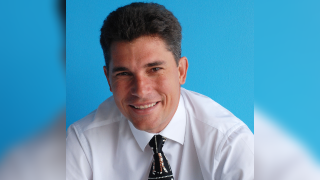Humanitarian response initiatives are often viewed as being purely short-term missions, but in reality, they go far beyond short-term strategies. In the face of more a complex, protracted humanitarian crisis, long-term initiatives are necessary to assist the victims throughout the crisis and help them regain control of their lives. Short and long-term humanitarian responses are something that we specialise in at Télécoms Sans Frontières (TSF), and our comprehensive education programmes are a key element of the support we provide to crisis victims.
Why is digital education important?
The human component is at the core of everything that we do at TSF, and our digital education strategies are no exception. Humanitarian crises disrupt more than politics and infrastructure: they are also disruptive to overall development. Trauma can lead to problems such as learning difficulties and low self-confidence. Affected young people often find it extremely difficult to integrate into new schools, let alone a new country as is sometimes the case after a disaster.
TSF’s digital education programmes help children regain control over their childhood in an environment that supports their growth and development. Children regain their self-confidence, learn digital skills and integrate more successfully into their local community. However, since no two contexts are the same, digital education programs need to adapt accordingly. Digital technologies are tools that can help vulnerable communities in different ways, from community development to improved psychological well-being. TSF’s Lab4Future and IT Cup Centres are two examples of this.
Lab4Future
In March 2011, Syria was struck by a series of anti-government rebellions known as the ‘Arab Spring’ movement which we met with violent responses from the government. Out of the 5.6 million refugees from the country, 3.6 million fled to Turkey. In 2020, TSF launched the ‘Lab4Future’ project, which built on seven years of work supporting refugee children through digital tools in Syria and Turkey.
The project aims to improve the well-being of vulnerable children and youth by providing them with a safe environment that builds their self-confidence and encourages creativity through digital technologies. It is based on a learning-by-doing approach and promotes peer knowledge sharing. Through the proposed activities and a tailored pedagogical approach, participants improve their self-confidence while learning basic digital and programming skills. The project is formed of two main activities:
• A programming workshop that helps participants discover the basic concepts of programming in a fun way. It includes different levels based on different platforms such as Scratch and educational robots.
• An online safety workshop helps participants understand how the internet works, and the risks and opportunities of being online.
In Turkey, during the pandemic, TSF provided children with remote digital activities via an online platform and regularly checked in with the children through a WhatsApp group chat and daily video calls to try to minimise any further disruptions to their education.
The IT Cup programme in Madagascar
In 2011, the city of Miarinarivo, which is home to many administrative bodies and schools, had no access to the internet due to a previous natural disaster in Madagascar. In partnership with fellow NGO IT Cup, TSF set up the IT Cup Centre to encourage social links through digital technologies. This project aims to participate in the region’s development by introducing digital tools and connectivity through activities.
A cyber cafe was the first activity implemented in the Centre. It now welcomes more than 600 members every month and provides access to computers and a secure internet connection. Following the introduction of the cyber cafe, the IT Cup Centre partnered with local schools to start an “Introduction to Computers” training course.
The Centre also offers many extracurricular activities, including a technical club and after-school support. The technical club introduces students to the basics of programming and robotics using software such as Scratch. Every Saturday, students from all over the town seeking support with science, maths or physics come to the IT Cup Centre, where the TSF team and local professors are on hand to support their learning. In all of the Centre’s activities, we focus on raising awareness of the responsible use of digital technologies. For 10 years, the IT Cup Centre has grown and become a central player in Miarinarivo’s digital scene.
Digital education is a long-term humanitarian response strategy that should not be overlooked, as providing support after a crisis goes far beyond short-term responses. You can visit TSF’s website to learn more about how we help vulnerable children regain control of their lives through digital education.









